Usha Bhatta is a Post Doctoral Research Scientist working with CucCAP Plant Pathologist Dr. Lina Quesada-Ocampo in the Vegetable Pathology Lab at North Carolina State University, Department of Entomology and Plant Pathology and the NC Plant Sciences Initiative. Usha’s hometown is Mahendranagar, Nepal and she focus of her work in the Quesada-Ocampo lab is Plant pathology, genomics, integrated disease management.
Introduce yourself—your background, where you are now, and your current research focus.
I’m Usha Bhatta, originally from the lush landscapes of Nepal, where agriculture thrives amidst the grandeur of the Himalayas. I received my PhD in Plant Pathology from the University of Georgia in Athens, Georgia, in 2023. My doctoral research focused on comparative genomics and transcriptomics, utilizing gene silencing techniques to identify the genetic factors conferring maize resistance to the fungal pathogen Ustilago maydis. Through my research, I gained hands-on experience in laboratory and field experiments to investigate the effect of host-pathogen interactions on crop growth and yield.
After graduating, I moved to Raleigh and joined NC State University as a postdoctoral researcher in Quesada lab. My primary focus now revolves around combating Fusarium root rot in sweet potatoes, a major concern in North Carolina, caused by Fusarium solani. Additionally, I’m also studying downy mildew disease in cucurbits caused by Pseudoperonospora cubensis. This foliar disease poses a significant threat to cucurbit crops across the USA. I am excited about the opportunity to work with the diverse team of experts in the lab.
Why did you choose to work with Cucurbits, plant pathology, and genomics?
Since childhood, I’ve been captivated by the diverse nature of crops, their remarkable adaptability to different environments, and the intricate mechanisms governing their susceptibility to diseases. Through my academic journey and hands-on experience in research labs, I became passionate about harnessing the power of plant pathology and genomics to develop crop varieties that are resilient to climate change and resistant to diseases. This position offers opportunities to independently research Fusarium solani and Pseudoperonospora cubensis, the causal agents of fusarium root rot of sweetpotato and cucurbit downy mildew. I am interested in population genetics, fungicide resistance mechanisms, and pathogen evolution. Understanding pathogen dynamics will strengthen my research skills and collaborations. Moreover, delving into plant pathology allows me to address pressing global challenges such as food security and sustainable agriculture. By understanding the genetic basis of plant diseases through genomics, I aim to contribute to developing robust crop varieties, thus curbing yield losses and reducing the reliance on chemical interventions.
What do you hope to accomplish during your time working on the CucCAP grant, and what do you most look forward to in this position?
I hope to gain a deeper understanding of sweet potato and cucurbit diseases by focusing on developing efficient strategies for their management and prevention. This involves conducting research to address knowledge gaps concerning these diseases, encompassing the study of pathogens, their interactions with host plants, and exploring innovative disease management approaches.
What excites me most about this position is the chance to engage in interdisciplinary collaborations with fellow scientists, pooling diverse expertise to tackle complex challenges in plant pathology. Moreover, the opportunity for continuous learning and exploration in the field of plant pathology and disease management, along with the satisfaction of knowing that my work could make a meaningful impact on agriculture and food production, would be extremely rewarding.
Please provide a brief description of your research.
Fusarium species have been identified as pathogens affecting sweet potatoes and cucurbits, alongside specific species targeting each crop. My primary research objective is to characterize gene expression, monitor metabolites, mycotoxins, and volatiles, and utilize a multi-omics approach to identify key factors in disease modulation. This research is crucial for advancing our understanding of Fusarium diseases in these crops, potentially facilitating early detection and intervention strategies to minimize crop losses and mitigate associated health risks. Furthermore, I am actively involved in addressing cucurbit downy mildew foliar disease, caused by Pseudoperonospora cubensis, a goal achievable through effector-assisted breeding for the development of downy mildew-resistant cucurbits. Through these efforts, I aim to enhance the resilience and sustainability of sweet potato and cucurbit production systems, ultimately benefiting farmers, consumers, and the agricultural industry as a whole.
What is your favorite crop, pathogen, and type of plant disease?
Favorite Crops: Cucurbits, Sweetpotato, and Maize; Favorite Pathogens: Fusarium solani, Ustilago maydis, and Pseudoperonospora cubensis; Favorite Plant Diseases: Root crop diseases and Fruit crop diseases.
Do you have any social media handles that you want included?
Twitter: @bhattarays and Linkedin
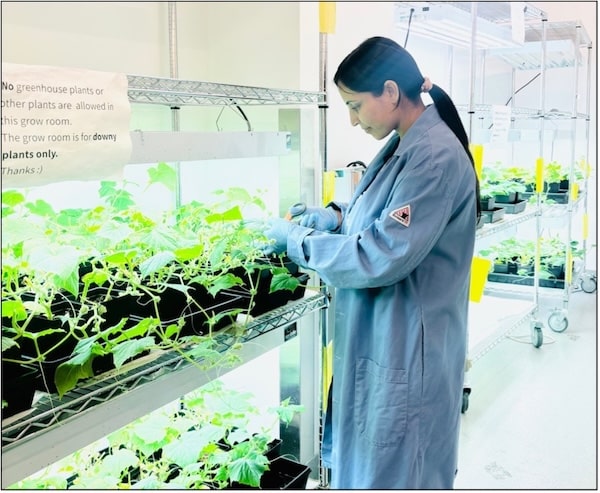
Usha utilizes the Straight eight cucumber variety, grown in a specialized grow room dedicated to propagating the cucurbit downy mildew pathogen. She meticulously selects green, sturdy leaves with thick stems and then trims them with scissors. These leaves are subsequently utilized to propagate downy mildew, either from downy infected leaf tubes stored at -80°C or from freshly sporulating leaves of the specific isolate.
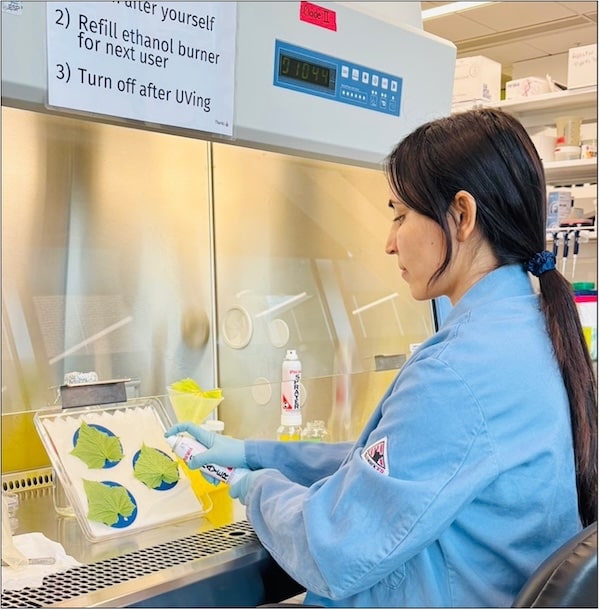
Usha utilizes downy infected leaves obtained either from -80°C storage or freshly sporulating leaves for downy propagation. These infected leaves are placed on a funnel within a biosafety cabinet, ensuring that the side with sporulation faces outward. With the help of a Preval sprayer, autoclaved water is sprayed onto the infected leaves, facilitating the collection of sporangia in a 50 ml tube positioned at the bottom of the funnel. Subsequently, healthy leaves are arranged on the bioassay dish, placing their undersides facing upward. Using another Preval sprayer, she administers the spore suspension from the 50 ml tube on the fresh cucumber leaves until microdroplets form. Following inoculation, she seals the lid and transfers the dish into the incubator for further observation.
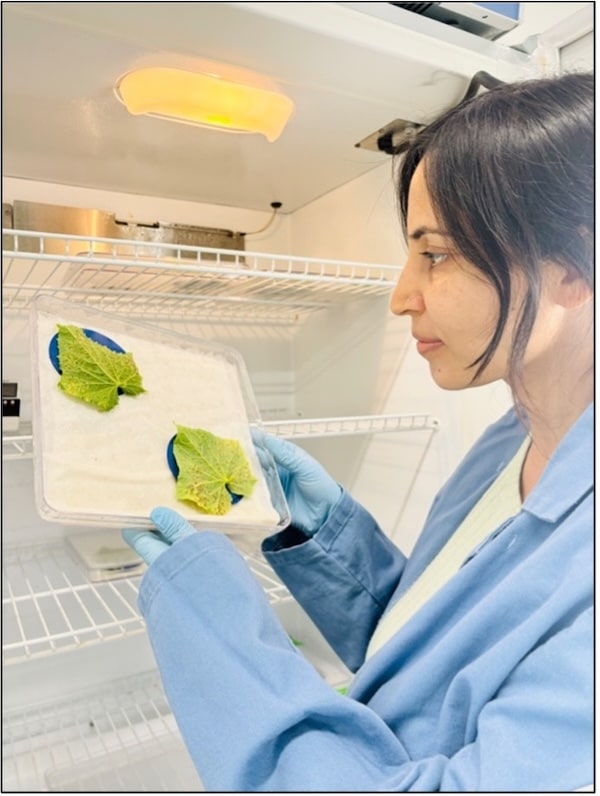
Seven days post inoculation, Usha monitors the growth of downy mildew pathogen on the cucumber leaves placed inside the incubator designed for downy mildew. The leaves exhibit angular lesions with a yellowish hue, gradually changing from yellow to brown.
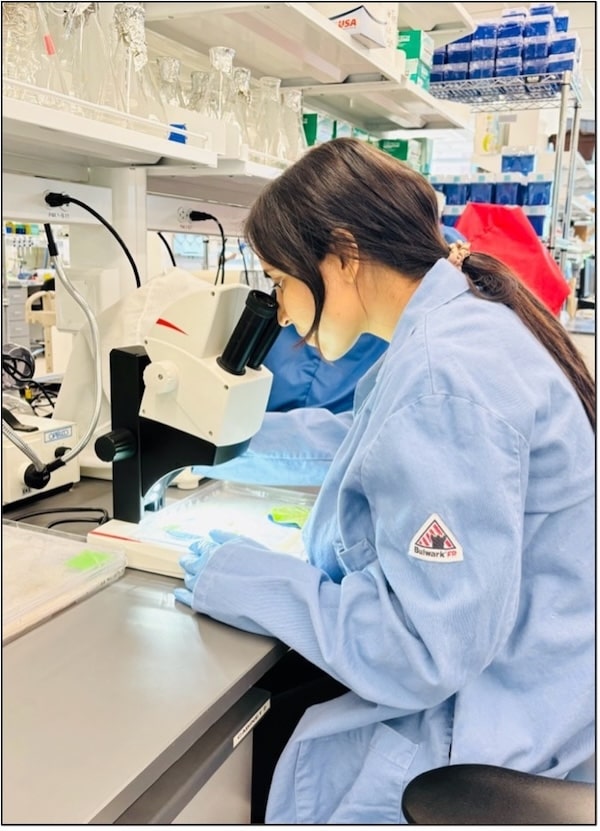
Usha uses a dissecting microscope to observe the sporulation of cucurbit downy mildew on the underside of the leaf, uncovering their secrets through careful examination.

Usha carefully examines an agar plate containing the fungal pathogen Fusarium solani isolated from sweetpotato, in preparation for nanopore sequencing. To gain genomic insights into the Fusarium pathogen, the researcher must initially culture the pathogen to extract its DNA, thereby enabling subsequent sequencing.
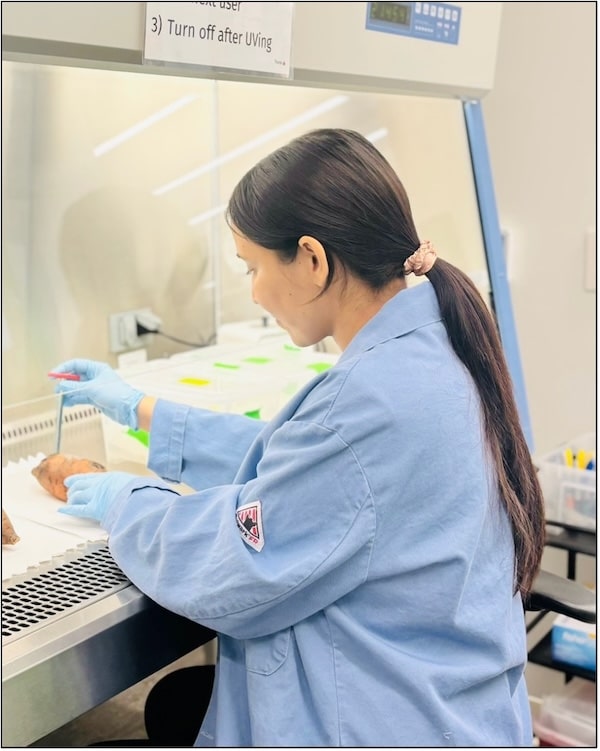
Usha induces circular wounds on sweetpotato roots using a cork borer and introduces Fusarium solani mycelium into the wound. This procedure aims to investigate the pathogen’s infection mechanisms and impact on sweetpotato roots. The objective is to elucidate host-pathogen interactions and support diagnostic and sequencing goals.
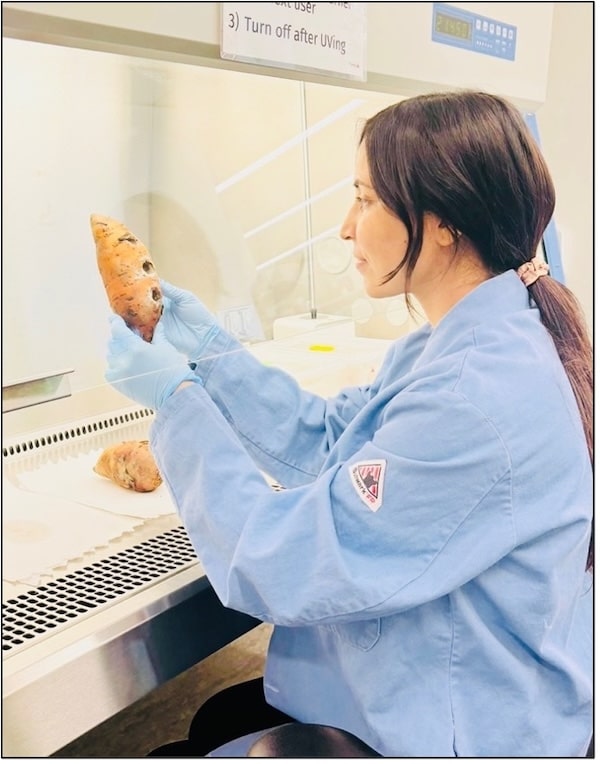
Usha views the sweetpotato roots infected with Fusarium solani after 8-10 days post-inoculation. White mycelia of Fusarium solani can be seen growing inside the cavities.
